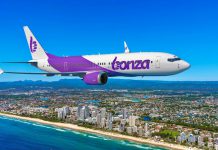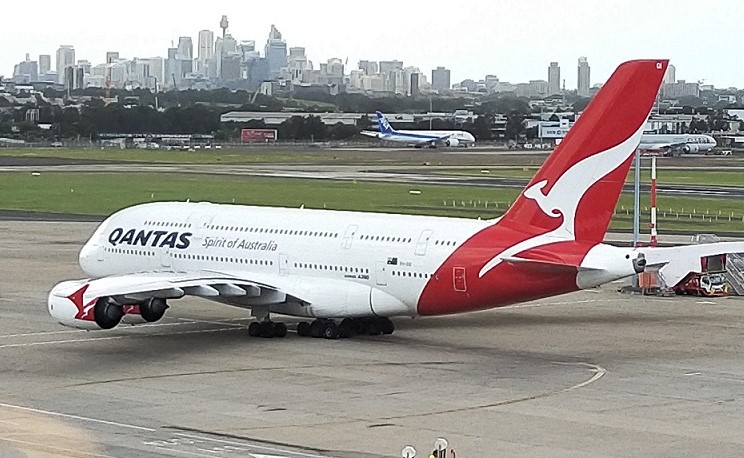Qantas will reduce capacity by the equivalent of 18 planes in the second half of the financial year due to the coronavirus and expects the crisis to wipe up to $A150m from its full-year earnings.
The airline yesterday posted an underlying first-half profit of $A771 million, down just $A4 million, but signaled tougher times ahead as it reduces flights to cope with a fall in demand.
It said Group international capacity was expected to be down 3.8 percent in the second half and domestic capacity would fall 2.3 percent.
The net profit impact of the coronavirus of $A100m to $A150m will be softened by lower fuel prices but flights to New Zealand and Asia will be cut and there will be a reduction in domestic capacity.
The airline said it would temporarily cut Qantas International Asian capacity by 16 percent and group flying between Australia and New Zealand by about 5 percent.
The Jetstar Group will cut its capacity to Asia by 14 percent until at least the end of May.
Group domestic capacity is expected to be reduced by 2 percent, with about half the cancellations between Sydney, Melbourne and Brisbane.
“There are obviously some challenges facing us in the second half – but we’re confident that we can manage the impact, as we have in the past,’’ Qantas chief executive Alan Joyce said.
The Sydney-Shanghai route will remain suspended until the end of May — possibly longer — and flights to Hong Kong from Sydney, Brisbane and Melbourne are being reduced.
Sydney-Hong Kong will reduce from 14 return flights a week to seven, while Brisbane-Hong Kong falls from seven weekly to four. Melbourne-Hong will go from a daily service to five flights per week.
Melbourne-Singapore flights will be operated by a smaller Boeing 787 instead of an A380 superjumbo, cutting about 250 seats per flight.
Qantas will cut flights across the Tasman by 6 percent with cancellations on Sydney-Auckland, Melbourne-Auckland and Brisbane-Christchurch. Jetstar will reduce its Tasman flying by 5 percent.
The airline said it would contact affected customers and offer alternatives,
It said there would be no change to other key parts of the Qantas network, such as the US and UK.
The cuts are the equivalent of grounding 18 aircraft across Qantas and Jetstar until the end of May and affect about 700 full-time jobs.
“To avoid job losses, we’ll be using leave balances across our workforce of 30,000 and freezing recruitment to help ride this out,” Joyce said.
“We’ll also take advantage of having some aircraft on the ground by bringing forward planned maintenance.”
It ‘s not clear how long the coronavirus impact will last but the airline has the flexibility to respond further if it needs to.
Chief financial officer Vanessa Hudson said the airline could extend the capacity cuts through to the end of the financial year if the weakness continued or deepen the cuts if demand weakened.
It is moving to stimulate demand by launching double status credits for all Qantas operated flights booked between February 20 and 25 as well as launching sales on Jetstar.
The airline is well placed to handle the downturn from a financial perspective and Joyce said it would be ready for an expected rebound when it ended.
The SARS virus resulted in pent-up demand and Joyce said the same was expected of the latest outbreak.
He said the airline was using paid leave and bringing forward maintenance so it could fly the entire fleet when the market did recover.
“This is an evolving situation that we’re monitoring closely,” he said. “We know demand into Asia will rebound. And we’ll be ready to ramp back up when it does.
“These past few months have been extraordinarily difficult for the tourism industry and we’ve tried to minimize our capacity reductions as much as possible.”
The airline’s underlying profit came in the face of headwinds that included $A51 million in higher foreign exchange costs, a $A68 million impact on international freight from unrest in Hong Kong.
A $A55 million increase in domestic airport overheads due to terminal sales combined with demand weakness to produce a $A47 million reduction in underlying earnings to bring the group domestic figure to $A645 million.
But international earnings before interest and tax (EBIT) rose by $A4 million to $A162 million.
Loyalty continued ts earnings growth with another record profit, recording a 12 percent rise in EBIT to $A196 million.
.
























